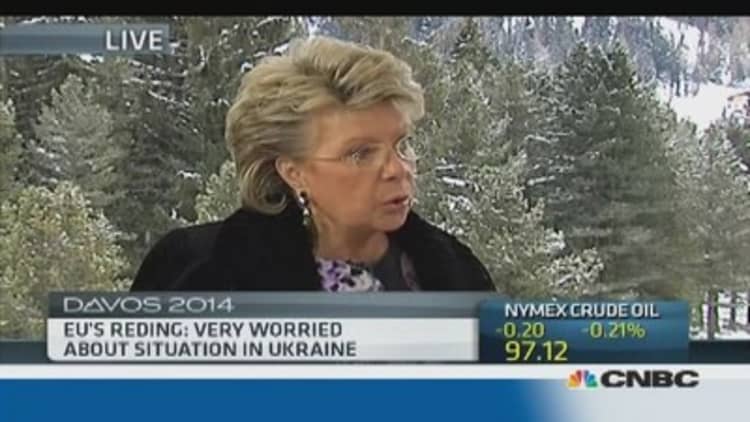The European Commission has outlined plans to crack down on risky trading activities at the region's biggest banks in an effort to stop those deemed "too big to fail" from threatening a country's economy.
The proposed rules, outlined on Wednesday, ban proprietary trading in financial instruments and commodities at banks and allow supervisors to separate riskier trading (such as complex derivatives and securitization operations) from the "safe" side of banking (like customer deposits).
To prevent banks from getting around the rules by shifting activities into the less-regulated shadow banking sector, the Commission also outlined separate measures to boost the transparency of shadow banking.
The Commission – the European Union's executive arm – hopes the reforms will prevent the region's largest banks from having to be bailed out by its taxpayers if things go wrong.
(Read more: EU banking union: What you need to know)
As the financial crisis took hold in 2008, a number of banks were considered so big that they could not fail without damaging the broader financial sector or the economy. As a result, numerous banks were given state support, including Citigroup and Bank of America in the U.S. while in Europe Lloyds Banking Group, Royal Bank of Scotland, Spain's and Germany's Commerzbank have all received state bailouts.
In a statement, the Commission's head of internal market and services, Michel Barnier, described the proposals as the "final cogs in the wheel" in the overhaul of Europe's banking system.
"This legislation deals with the small number of very large banks which otherwise might still be too-big-to-fail, too-costly-to save, too-complex-to-resolve," he said.
"The proposed measures will further strengthen financial stability and ensure taxpayers don't end up paying for the mistakes of banks."
The move comes after U.S. agencies approved the so-called Volcker Rule - a centerpiece of the Dodd-Frank Act designed to rein in the sort of risky trading that contributed to the 2008 financial crisis - in December. The rule cracks down on a variety of bank hedging activities, including positions meant to offset a bank's overall risk.
(Read more: European Union launches clampdown on shadow banking)
The Commission's blueprint provides a common framework at an EU level, which Barnier said was necessary to ensure that different national solutions did not undermine its aims.
But the proposals have already come up against resistance from countries including France and Germany, who argue the measures go too far.
Pierre Moscovici, France's finance minister, said the respective laws in France and Germany were "in complete conformity with the spirit of the Liikanen report (a set of bank reform recommendations)," according to the Financial Times.
(Read more: More action needed to end 'too big to fail')

He added that the Commission "should take into account what has already been legislated in the two countries," the newspaper added.
Meanwhile, Reuters reported that Germany's finance minister Wolfgang Schaeuble said on Tuesday he had urged the Commission to "think carefully" when drafting the new law.
In the statement released Wednesday, however, Barnier stressed: "The proposals are carefully calibrated to ensure a delicate balance between financial stability and creating the right conditions for lending to the real economy, particularly important for competitiveness and growth."
(Read more: What you need toknow about the Volcker Rule)
It is not the first time that Europe's leaders have disagreed over banking reforms.
Last year there were months of tough negotiations over plans to create a region-wide "single resolution mechanism" by 2015, which would centralize the control and rescue of failing euro zone banks.
Also, the European Central Bank will take on the role of a "single supervisory mechanism" to oversee the euro zone's biggest and most important banks.
Follow us on Twitter: @CNBCWorld


